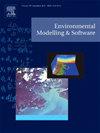相互依存系统中整合地理因素的级联效应建模
IF 4.8
2区 环境科学与生态学
Q1 COMPUTER SCIENCE, INTERDISCIPLINARY APPLICATIONS
引用次数: 0
摘要
自然灾害和流行病等全球性破坏的级联效应吸引了大量的研究关注。目前的方法在充分整合地理和系统因素方面面临挑战,限制了它们模拟相互依赖系统的复杂动态的能力。在这里,我们提出了一个新的基于相互依赖网络的地理级联(INGC)模型,通过耦合地理因素来捕捉全球相互依赖网络中的级联冲击。通过整合宏观层面的相互依赖关系和典型的动态网络建模方法,INGC能够更准确地模拟危险损害和冲击传播,突出关键节点和路径,对知情决策至关重要。通过对全球封锁案例的分析,INGC模型通过稳健地揭示异质级联模式及其细节,在识别关键部门和地区方面具有优势。这种方法为未来的研究和政策提供了一个可扩展的框架,确保在面对复杂的全球极端事件时具有更大的弹性。本文章由计算机程序翻译,如有差异,请以英文原文为准。
Cascading effect modelling of integrating geographic factors in interdependent systems
Cascading effects from global disruptions such as natural disasters and pandemics have attracted significant research attention. Current approaches face challenges in adequately integrating geographic and systemic factors, limiting their ability to simulate the intricate dynamics of interdependent systems. Here, we proposed a novel Interdependency Network-based Geographic Cascade (INGC) model, coupling geographic factors to capture cascading shocks across global interdependent networks. By integrating macro-level interdependencies and typical dynamic network modelling approaches, the INGC enables more accurate simulations of hazard damage and shock propagation, highlighting critical nodes and pathways essential for informed policy-making. Through the global lockdown case analysis, the INGC model demonstrated its advantages in identifying critical sectors and regions by revealing heterogenous cascading patterns and their details robustly. This approach offers a scalable framework for future research and policy, ensuring greater resilience in the face of complex global extreme events.
求助全文
通过发布文献求助,成功后即可免费获取论文全文。
去求助
来源期刊

Environmental Modelling & Software
工程技术-工程:环境
CiteScore
9.30
自引率
8.20%
发文量
241
审稿时长
60 days
期刊介绍:
Environmental Modelling & Software publishes contributions, in the form of research articles, reviews and short communications, on recent advances in environmental modelling and/or software. The aim is to improve our capacity to represent, understand, predict or manage the behaviour of environmental systems at all practical scales, and to communicate those improvements to a wide scientific and professional audience.
 求助内容:
求助内容: 应助结果提醒方式:
应助结果提醒方式:


